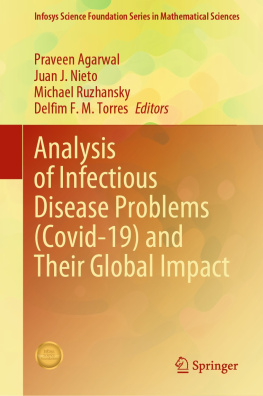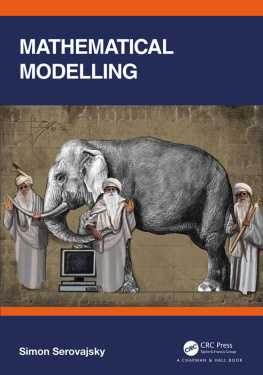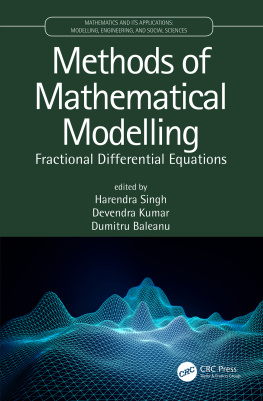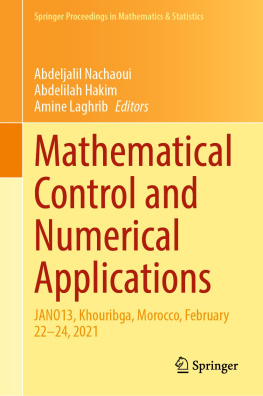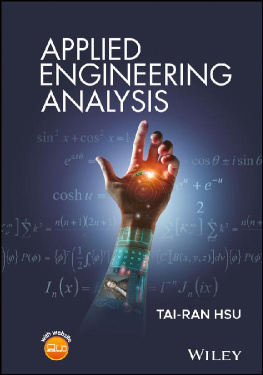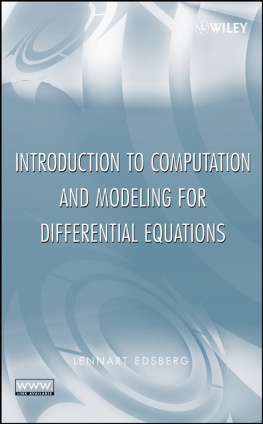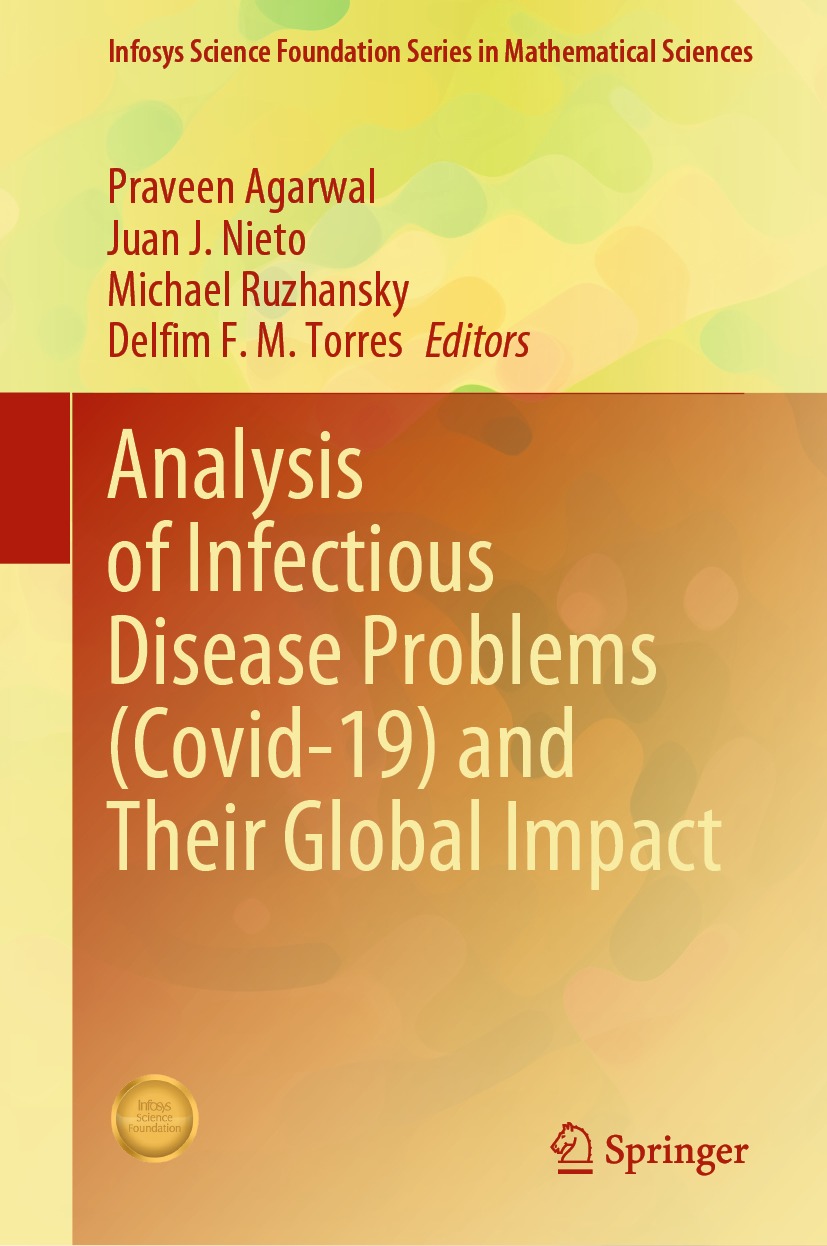Infosys Science Foundation Series Infosys Science Foundation Series in Mathematical Sciences
Series Editors
Gopal Prasad
University of Michigan, Ann Arbor, USA
Irene Fonseca
Carnegie Mellon University, Pittsburgh, PA, USA
Editorial Board
Chandrashekhar Khare
University of California, Los Angeles, USA
Mahan Mj
Tata Institute of Fundamental Research, Mumbai, India
Manindra Agrawal
Indian Institute of Technology Kanpur, Kanpur, India
Ritabrata Munshi
Tata Institute of Fundamental Research, Mumbai, India
S. R. S. Varadhan
New York University, New York, USA
Weinan E
Princeton University, Princeton, USA
The Infosys Science Foundation Seriesin Mathematical Sciences, a Scopus-indexed book series, is a sub-series of the Infosys Science Foundation Series. This sub-series focuses on high-quality content in the domain of mathematical sciences and various disciplines of mathematics, statistics, bio-mathematics, financial mathematics, applied mathematics, operations research, applied statistics and computer science. With this series, Springer and the Infosys Science Foundation hope to provide readers with monographs, handbooks, professional books and textbooks of the highest academic quality on current topics in relevant disciplines. Literature in this sub-series will appeal to a wide audience of researchers, students, educators, and professionals across mathematics, applied mathematics, statistics and computer science disciplines.
More information about this subseries at http://www.springer.com/series/13817
Editors
Praveen Agarwal , Juan J. Nieto , Michael Ruzhansky and Delfim F. M. Torres
Analysis of Infectious Disease Problems (Covid-19) and Their Global Impact
1st ed. 2021

Logo of the publisher
Editors
Praveen Agarwal
Anand International College of Engineering, Jaipur, Rajasthan, India
Juan J. Nieto
Institute of Mathematics, University of Santiago de Compostela, Santiago, Spain
Michael Ruzhansky
Department of Mathematics: Analysis, Logic and Discrete Mathematics, Ghent University, Ghent, Belgium
Mathematical Sciences, Queen Mary University of London, London, UK
Delfim F. M. Torres
Department of Mathematics, University of Aveiro, Aveiro, Portugal
ISSN 2363-6149 e-ISSN 2363-6157
Infosys Science Foundation Series
ISSN 2364-4036 e-ISSN 2364-4044
Infosys Science Foundation Series in Mathematical Sciences
ISBN 978-981-16-2449-0 e-ISBN 978-981-16-2450-6
https://doi.org/10.1007/978-981-16-2450-6
Mathematics Subject Classication (2010): 26A33 42A38 42B10 46F12 65R10 65F35 65J05 26A18
The Editor(s) (if applicable) and The Author(s), under exclusive license to Springer Nature Singapore Pte Ltd. 2021
This work is subject to copyright. All rights are solely and exclusively licensed by the Publisher, whether the whole or part of the material is concerned, specifically the rights of translation, reprinting, reuse of illustrations, recitation, broadcasting, reproduction on microfilms or in any other physical way, and transmission or information storage and retrieval, electronic adaptation, computer software, or by similar or dissimilar methodology now known or hereafter developed.
The use of general descriptive names, registered names, trademarks, service marks, etc. in this publication does not imply, even in the absence of a specific statement, that such names are exempt from the relevant protective laws and regulations and therefore free for general use.
The publisher, the authors and the editors are safe to assume that the advice and information in this book are believed to be true and accurate at the date of publication. Neither the publisher nor the authors or the editors give a warranty, expressed or implied, with respect to the material contained herein or for any errors or omissions that may have been made. The publisher remains neutral with regard to jurisdictional claims in published maps and institutional affiliations.
This Springer imprint is published by the registered company Springer Nature Singapore Pte Ltd.
The registered company address is: 152 Beach Road, #21-01/04 Gateway East, Singapore 189721, Singapore
Preface
Any condition which interferes with the normal functioning of the body and which causes discomfort or disability or impairment of the health of a living organism is called a disease. The disease agent is a factor (substance or force) which causes a disease by its excess or deficiency or absence. The impact of severe diseases on people is a real concern in terms of suffering as well as social and economic implications. In recent era, there are several communicable diseases, namely Covid-19, malaria, dengue fever, HIV/AIDS, tuberculosis, cholera, Zika virus, chickenpox, influenza, pneumonia, and so on, which impair the health of the human population around the globe. Some of these communicable diseases carry from person to person by viral diseases and their pathogens, which impact the human body through sexual intercourse.
In recent years, the control of these acute diseases has been a great concern for bio-mathematicians and medical experts. It has been approved that these infectious diseases are fatal to billions of people and also cause the loss of their worth. Mathematical modeling plays a crucial role in the study of these adverse types of diseases. The basic ambition to evaluate and eradicate these diseases through mathematical models is to minimize their effects by understanding their mechanism and the agents that cause the spread of these diseases, so that it gives a better chance to predict these diseases and their impacts and also give a way to control them. Mathematical models allow us to extrapolate from current information about the state and progress of an outbreak to predict the future and, most importantly, to quantify the uncertainty in these predictions. Most of these mathematical models contain ordinary or partial differential equations. In some cases, instead of integer order, fractional order can be used to analyze the real phenomena behind the problems. In one way or another, researchers encounter different kinds of nonlinear ordinary or partial differential equations.
The aim of this edited volume is to collect original research articles that focus on recent results, which can be obtained from the novel methods constructed by many researchers, for all types of infection diseases, as well as developments in recent methods with new operators or new approximations. It is also involving the review articles discussing the current state of the art.
In this book, we are happy to have 30 chapters in two parts. Part I is based on general analysis, and Part II contains papers on country-specific analysis on Covid-19. All chapters are contributed from eminent researchers around the globe who are internationally known experts in their fields. Throughout this book, the analysis of infectious disease problems (Covid-19) and their global impact have been explained very carefully in the simplest possible terms and illustrated by a number of complete workout examples. This book contains some useful theorems and their proofs.

